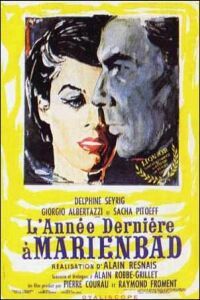 Don't expect me to solve Alain Resnais' famous time-and-memory puzzle; I'm not sure if it has an actual solution. The truth of whether Delphine Seyrig's character actually met Giorgio Albertazzi's protagonist at the resort hotel the year before is less important to Resnais or writer Alain Robbe-Grillet, I suspect, than the process by which the man attempts to force his memory upon the woman, or the fact of the man's confusion. You might even ask whether the "this year" of the narrative is taking place at the real Marienbad or in a memory palace in the man's mind. We know he is a creature of repetitive routine. He hits all the resorts every year. He is as much a spectator as an active personality. Given all that, it's just as possible that the man has lost himself in the collective consciousness that converges annually at Marienbad and other places.
Don't expect me to solve Alain Resnais' famous time-and-memory puzzle; I'm not sure if it has an actual solution. The truth of whether Delphine Seyrig's character actually met Giorgio Albertazzi's protagonist at the resort hotel the year before is less important to Resnais or writer Alain Robbe-Grillet, I suspect, than the process by which the man attempts to force his memory upon the woman, or the fact of the man's confusion. You might even ask whether the "this year" of the narrative is taking place at the real Marienbad or in a memory palace in the man's mind. We know he is a creature of repetitive routine. He hits all the resorts every year. He is as much a spectator as an active personality. Given all that, it's just as possible that the man has lost himself in the collective consciousness that converges annually at Marienbad and other places.We know he's lost something. He is, in fact, a chronic loser, always being beaten in the peculiar game he plays repeatedly with Sacha Pitoeff's character. That guy's invincibility tempts me to view him symbolically, but I catch myself when I start wondering whether he's Death or not, because then I know that I'm confusing L'Annee derniere a Marienbad with its nearly-coincidental counterpart, Herk Harvey's indie one-off wonder of 1962, Carnival of Souls. I'm not the first person to see and hear similarities (architecture, organ music, dancing), and I agree with those who doubt whether Harvey had a chance to see the Resnais before starting his own film.
Four faces of future Daughter of Darkness Delphine Seyrig in Last Year at Marienbad.
Instead, the two films seem to stem from a common zeitgeist stirring in western civ which seems to equate a compulsive sociability with at least a kind of death which the occasional alienated consciousness struggles to comprehend. Also, I'm tempted to think of death because of the double meaning of the English word "Last" as "final" as well as "previous." I don't know if "derniere" has the same ambiguity, but if so perhaps Marienbad might be seen as some kind of actual limbo instead of a figurative one.
Marienbad: the architecture of Hell? It looks like a helluva place to visit.
I think that's enough to suggest that Marienbad will give food for thought to any viewer who can stand being disappointed by a lack of straight answers. The producers promoted it as a puzzle film in which each viewer would collaborate in constructing the "real" narrative, so it really is up to each of us to figure the thing out for ourselves. All I can say definitively is that Marienbad is one of the ultimate expressions of black-and-white cinema, a spectacle of art direction that demands attention and rewards it even if you can't quite determine what's going on. If that's the same way I feel after watching some Italian gialli, that's probably no accident, since I can see Marienbad's influence on that genre (as well as on Kubrick's The Shining, I might add). Resnais's film is a textbook example of one in which style is substance, and anyone who honors cinema as a visual art owes it a look someday.
The original French trailer, with English subtitles, was uploaded to YouTube by shihlunTW

2 comments:
Yes, Samuel, one that is always intriguing to watch but I still have no clue what to make of it. It looks great though, which is about half the battle!
It's great but it's almost impossible to watch all the way through, like 2 hours of outtakes from a Giorgio Armani perfume commercial. On the other hand, in the right mood, any 20 minutes of it can be brilliant. On the other hand, though, it sucks, brilliantly, and is brilliant, yet sucks. Carnival of Souls is better. The real problem is Seyrig needs to be blonde, then it makes more sense. (my acidemic review here)
Post a Comment